Busting the Myth: Do Vitamins Burn Belly Fat?
Have you ever wished losing belly fat was as easy as popping a pill or sipping a smoothie? Well, what if I told you that certain vitamins might hold the key to achieving a trimmer waistline? While there’s no miracle cure for weight loss, emerging research suggests that specific vitamins may play a role in targeting and torching stubborn fat deposits around your belly.
So put down those sit-up plans and grab your bottle of multivitamins – it’s time to answer the burning question: do vitamins burn belly fat? Let’s dive into whether these essential nutrients can truly help us say goodbye to love handles and hello to a slimmer silhouette.
Vitamins and Belly Fat
The relationship between vitamins and belly fat is complex, and it involves various factors, including diet, metabolism, and overall health. While vitamins don’t directly cause or eliminate belly fat, they are essential in regulating processes that can impact your body composition and fat distribution.
Here’s a breakdown of some vitamins and their potential connections to belly fat:
Vitamin D:
Some evidence suggests that vitamin D deficiency may be linked to increased belly fat. Adequate vitamin D levels are essential for overall health and may influence fat storage and metabolism. However, research in this area is ongoing, and the relationship between vitamin D and belly fat isn’t fully understood.
Vitamin C:
Vitamin C is an antioxidant that supports the body’s immune system and may indirectly help with weight management. Some studies have shown that individuals with sufficient vitamin C levels tend to have smaller waist circumferences. This may be because vitamin C produces carnitine, which helps the body use fat for energy.
Vitamin E:
Vitamin E is an antioxidant that helps protect cells from damage. While it doesn’t directly influence belly fat, it’s important for overall health. A healthy body can more effectively manage fat storage and metabolism.
B Vitamins:
B vitamins, including B6, B12, and folate, are involved in energy metabolism. They help convert food into energy and play a role in metabolizing fats and proteins. An imbalance in B vitamin levels can affect your metabolism and potentially lead to weight gain.
Vitamin K:
Vitamin K is necessary for blood clotting and bone health. While it doesn’t directly affect belly fat, it’s essential for overall health, which can indirectly affect weight management.
Food Source for Different Vitamins
To support weight loss, it’s essential to include a variety of vitamins in your diet through whole foods. Here are some food sources of different vitamins that can aid in your weight loss efforts:
Vitamin C:
- Food Sources: Citrus fruits (oranges, grapefruits), strawberries, kiwi, bell peppers, broccoli, and Brussels sprouts.
Vitamin D:
- Food Sources: Fatty fish (salmon, mackerel, tuna), fortified dairy or plant-based milk, fortified cereals, and egg yolks.
Vitamin E:
- Food Sources: Nuts (almonds, sunflower seeds), seeds (sunflower seeds), spinach, and avocado.
Vitamin K:
- Food Sources: Leafy greens (kale, spinach, collard greens), broccoli, Brussels sprouts, and asparagus.
Vitamin B-complex:
- Food Sources: Vitamin B1 (Thiamine): Whole grains (brown rice, oats), legumes (lentils, black beans), and pork.
- Vitamin B2 (Riboflavin): Dairy products, lean meats, and leafy greens.
- Vitamin B3 (Niacin): Lean meats, poultry, fish, peanuts, and whole grains.
- Vitamin B5 (Pantothenic Acid): Avocado, mushrooms, and sunflower seeds.
- Vitamin B6 (Pyridoxine): Chickpeas, potatoes, and fortified cereals.
- Vitamin B7 (Biotin): Eggs, nuts, and sweet potatoes.
- Vitamin B9 (Folate): Leafy greens, legumes (black-eyed peas, lentils), and asparagus.
- Vitamin B12 (Cobalamin): Animal products (meat, dairy, eggs).
Studies on the Effectiveness of Vitamins for Belly Fat Loss
One study published in the Journal of Clinical Endocrinology & Metabolism found a link between vitamin D deficiency and increased belly fat. The researchers discovered that individuals with low levels of vitamin D in their blood also tended to have higher levels of abdominal fat.
This suggests that increasing vitamin D intake may help reduce belly fat. However, it is worth noting that more research is needed to fully understand the relationship between vitamin D and belly fat loss.
Another study published in the International Journal of Obesity examined the effects of a daily multivitamin supplement on weight loss and body composition. The participants who took the multivitamin supplement experienced a greater reduction in overall body weight, waist circumference, and subcutaneous fat than those who did not. These results suggest that taking a daily multivitamin may aid in reducing belly fat.
Overall, while some encouraging studies suggest that certain vitamins like vitamin D and multivitamins can help with belly fat loss, it’s important not to rely solely on supplements for weight management. Alongside proper nutrition and exercise, incorporating these vitamins into your routine may support your efforts toward losing belly fat.
The Limitations of Using Vitamins for Weight Loss
Using vitamins as a primary strategy for weight loss has several limitations and should not be considered a sole or effective method for shedding excess pounds. Here are some of the key limitations:
Lack of Direct Impact on Fat Loss:
Vitamins themselves do not directly cause fat loss. While certain vitamins are involved in metabolic processes that can influence weight management, they are not a standalone solution for weight loss.
Balanced Diet is Essential:
Weight loss and maintenance are primarily achieved through a balanced diet that balances macronutrients (carbohydrates, proteins, and fats) and micronutrients (vitamins and minerals). Vitamins cannot compensate for a poor diet high in calories and low in nutritional value.
Caloric Deficit is Crucial:
Weight loss is fundamentally about creating a caloric deficit, which means burning more calories than you consume. Vitamins alone do not create this deficit. You must control your caloric intake and increase physical activity to lose weight.
Individual Variability:
Everyone’s nutritional needs and metabolism are different. What works for one person may not work for another. Using vitamins as a weight loss strategy doesn’t account for these individual variations.
Potential for Harm:
Excessive intake of certain vitamins, either through supplements or fortified foods, can be harmful. When taken in excess, some vitamins can lead to toxicity and adverse health effects.
Final Thoughts
In conclusion, while taking vitamins alone may not directly burn belly fat, they can play a valuable role in weight loss and improving metabolic health. Certain vitamins, such as vitamin D and B-complex vitamins, have been linked to improved weight management and reduced body fat accumulation. However, it is important to remember that vitamins should not be seen as a magic solution for belly fat reduction.
To achieve lasting results, combining vitamin supplementation with a healthy diet, regular exercise, and lifestyle changes is essential. So, to shed some excess belly fat, consider incorporating the right vitamins into your overall weight loss plan for optimal results.
FAQs
Do multivitamins alone burn belly fat?
While multivitamins provide essential nutrients for overall health, they won’t directly burn belly fat alone. A balanced diet and regular exercise are imperative for achieving significant weight loss.
Is it enough to rely solely on vitamin intake to eliminate belly fat?
While vitamins can benefit weight management and overall health, they should be combined with a balanced diet and regular exercise for effective results.







